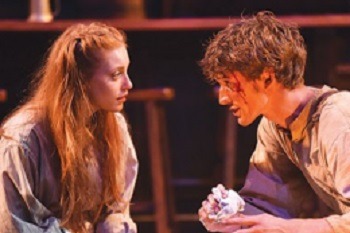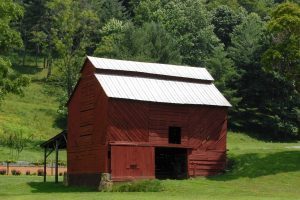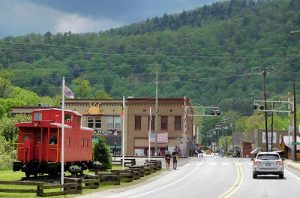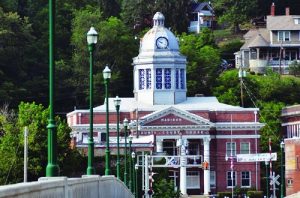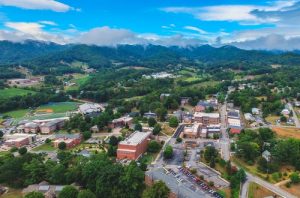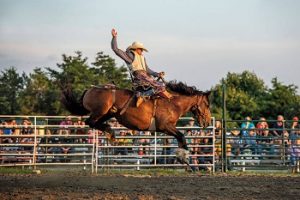Madison County is, without a doubt, fertile ground for traditional music. This was evident in 1916 when Cecil Sharp discovered the Wallin and Chandler families in the Laurel country who were singing in the tradition of their Scots-Irish ancestors who settled in the county a century before. This heritage is unmistakable today when the eighth generation of this family continues this musical tradition. It is an amazing place to grow up—especially if you are a musician. Joe Penland, musician, writer and storyteller, reflected on what this has meant to him and his memories of many of these musicians who are so important to those who live here.
Joe’s great-grandmother was a first cousin of Bascom Lamar Lunsford, Minstrel of Appalachia, and just one link in Joe’s rich musical heritage. He was mentored by Byard Ray (whose great uncle was Mitchell Wallin, a fiddler who played for Cecil Sharp) and spent his youth in the 1960s around Berzill and Lee Wallin as well as their sons Doug and Jack. He now writes, performs, and records while living in Marshall, NC, in the heart of traditional music. Joe is especially gratified to see the young musicians either those who are descendents of the Wallin/Chandler branch or just those who have some links and have grown out of this incredibly rich soil.
Full Interview:
“REFLECTIONS ON MADISON COUNTY’S MUSICAL HERITAGE” – AN INTERVIEW WITH JOE PENLAND,
JULY, 2010, MARSHALL, NORTH CAROLINA
Joe Penland’s own musical heritage is rich. His great-grandmother was a first cousin of Bascom Lamar Lunsford. He was mentored by Byard Ray (whose great uncle was Mitchell Wallin, a fiddler who played for Cecil Sharp) and spent his youth in the 1960s around Berzilla and Lee Wallin as well as their sons Doug and Jack. His recordings include Standing on Tradition and An Answer to My Prayer. He now writes, performs, and records while living in Marshall, NC, in the heart of traditional music.
The story of Madison County music is inextricably linked to the families who settled here. Many of the musicians are described first by who they are related to. And, to paint a true-to-the-voice-of-Madison-County picture, the best way to portray those musicians from past and present is to go straight to one of Madison County’s best known storyteller/ writer/musicians—Joe Penland. Joe’s great grandmother was a first cousin of Bascom Lamar Lunsford, Minstrel of Appalachia, and just one link in Joe’s rich musical heritage.
One afternoon in July 2010, Joe sat in a comfortable chair in a historic house in Marshall, North Carolina, that he had restored and shared stories of his memories of growing up surrounded by all this heritage. Joe started playing music at age 12 and played regularly throughout his life except for about fifteen years when he tried to be something he wasn’t in the corporate world. When he came back to Madison County, he knew this was where he belonged and he started writing, playing and singing again. “There’s something about this place that inspires me to write about my feelings and the human condition.” Like many of the stories of the musicians in Madison County, Joe comes by his talent for singing and storytelling naturally. His grandfather played five or six different instruments and his mother played in a family band when she was nine years old. Her father (Joe’s grandfather) died when she was thirteen and she never played again. But her sisters taught Joe how to sing and play—Aunt Mamie lent him a banjo and a guitar, and Aunt Marie provided the instructions.
Joe’s life took a turn when he returned to Madison County in 1995 as he faced a life-threatening illness. When recovering from the surgery, he made a list of what he had wanted to do in his life. Most of the items in his life centered around music and family. He made the decision that he was going to do what he could to make sure that his children and grandchildren would hear what he heard when he listened to the singers of the old ballads. A trip to the English and Scottish countryside to the Whitby Folk Festival solidified his conviction. For, the further back in the woods he traveled, the more he found people who “sang the way we sing.” He realized that when he sings a ballad, “the memory is so far back that I can’t even remember how I learned to sing it the way I do.” And, he began recording in earnest and sharing stories while performing both old ballads and his new songs. His greatest honor has been to be invited to perform at the Mountain Dance & Folk Festival in Asheville (the longest running folk festival in the U.S) “You get 8 minutes and no pay but to me it’s more of an honor than performing at the Grand Ole Opry.”
FAMILIES AND MUSICAL TRADITION
Madison County is fertile musical ground and has been for centuries. But, like most of our treasures, that fact remained unknown to the rest of the country and the world until the 20th century. When collecting the old ballads in the early 1900s Cecil Sharp called Madison County the richest repository of English folk songs in the world.
When Joe began talking about Madison County musicians, he talked first of one of the premiere musical families of the 20th century – the Wallins. Mitchell Wallin was the famous fiddler who played for Cecil Sharp. When one of his nephews, Lee Wallin, married Berzilla Chandler, two of the greatest musical families joined together.
According to Joe, Berzilla had such a sweet, clear voice that “if she couldn’t make your heart flutter when you listened to her, something was wrong with you.” Two of their children were Doug and Jack. Doug Wallin inherited his father’s charisma and Berzilla’s way with a song. He had the sweetest tenor voice and interspersed every song with a story. His brother Jack was a great banjo player and singer. Bertha Wallin McDevitt is the last of Lee and Berzilla’s children living and she still invites Joe onto the porch of their cabin home to sing and remember.
Mary Bullman Sands, Mitchell Wallin’s half sister, sang 25 “love songs” for Cecil Sharp. At the time of Cecil Sharp’s arrival, Mary was in her 40s and the mother of nine children and eight and one half months pregnant with her tenth. Sharp transcribed her singing many of the same ballads that are sung by present-day ballad singers or, as Joe put it, “almost all of the ballads I sing today were her ballads.”
HOT SPRINGS AREA MUSICAL FAMILY
Another important Madison County family in the early 1900s when Cecil Sharp came through collecting ballads was Jane Hicks Gentry. She is credited with being one of the people most responsible for remembering and saving a large number of medieval English folks songs including the now well-known “Froggie Went A – Courting”. She also told the “Jack Tales” that she learned from her grandfather Council Harmon.
Still another Hicks family member, Frank Proffitt, is credited with saving and adding to the old mountain folk song that became the “Ballad of Tom Dooley”. This song was based on a real story about a man named Tom Dula. The name Dula was pronounced Dooley in the mountains. Dula was hanged in Iredell County, North Carolina in the late 1800’s. Frank Proffitt heard the song sung by his father and grandmother. The Kingston Trio recorded the song in the 1960’s and it became world famous.
WIDESPREAD RECOGNITION
There had been surges of interest with the 1916 visit of Cecil Sharp and again in the 1930s when Bascom Lamar Lunsford was invited by President Franklin Roosevelt to bring singers and dancers to the White House to perform. But, with the happenstance of a family who moved to Madison County in the 1960s combined with the widespread medium of movies/documentaries, the interest became much more far-reaching. In the1960s, Peter and Polly Gott, musicians themselves, moved to Madison County because of the lure of the music. They came here with the idea that they didn’t want to change one thing about the county; they wanted it to change them. They totally assimilated into county life and met Lee Wallin, who introduced them to his relatives. According to Joe, Peter is “one of the reasons that our music received the recognition that it does today.” That was because of Peter’s friendship with Mike Seeger who played with John Cohen. Cohen came to Madison County in the early 60s and recorded Lee, Cas, Berzilla and several Wallin relatives for the album, Old Love Songs and Ballads, which was released in 1963. Cohen made subsequent field recordings of Wallin family members and their cousin, Dillard Chandler, who was the subject of Cohen’s 1973 documentary, The End of an Old Song. People started flocking to Madison County after that documentary was released.
MEMORIES OF MUSICIANS AND MENTORS
Joe grew up at this time in the 1960s and 70s when the rest of the country and the world were discovering the treasure of music in our county. In Joe’s words, “every holler has some hidden talent.” He was lucky enough to be discovering music at a time when Byard Ray (pronounced Bard) was living in Sodom Laurel (now called Revere) and loved to take young folk under his wing and show them how to play different musical instruments and sing the local ballads. Byard’s great uncle Mitchell Wallin was the famous fiddler who played for Cecil Sharp. Even though Mr. Sharp didn’t think much of him, Wallin is remembered for his improvisation. Byard’s roots are in Madison County even though he was born in New River, Tennessee. His father, William Morris Ray and mother Rilla Wallin had to follow the lumber camps to Tennessee when there was no more timber to work in this area. Eventually, the family came back to their home and settled here. Byard’s recording history began when a young man later to become a New York producer, discovered him at a Fiddlers Convention in the 1960s. He came home with Byard and stayed with him until Byard “kicked him out.” Later he signed Byard and his cousin Obray Ramsey to a record deal. Ramsey and Ray became the first musicians from Madison County to travel all over the world playing our traditional Madison County music. Joe remembers Byard as a charismatic handsome man whom women loved. Byardlived long after he recorded and toured and Joe wrote a song about Byard called “After the Fame is Gone.” which describes some of Joe’s memories of this great talent after he retired from touring.
Obray Ramsey developed a two-fingered style of picking that is a unique way of playing the banjo and Joe could only name one musician today who can do this—Jerry Adams. Obray Ramsey and Byard Ray played together as “White Lightnin’ and under their own names when they “fell out.”
TALENT THAT TOPS VASSAR CLEMENTS
Another musician who has a special place in Joe’s stories is Arvil Freeman – “one of the kindest, sweetest people you’ll ever meet.” He was born “poor as dirt” in the Paw Paw area of the county and grew to be one of the County’s best all-around musicians, although his best talent is on the fiddle. The best compliment Joe ever heard paid to Arvil was when Ralph Lewis (of Sons of Ralph) told him that he was making a record and Arvil couldn’t make it so they had to use Vassar Clements (a Grammy-award winner who has been dubbed the Father of Hillbilly Jazz). Arvil continued to teach in nearby Weaverville. One of his many award-winning students is Adam Masters who won the fiddle championship in 2010 at Fiddler’s’ Grove in Union Grove, North Carolina (home of the oldest continuous old time fiddlers’ contest in North America).
A current-day relative of the remarkable Wallin family (her great aunt by marriage is Dellie Chandler Norton—sister to Berzilla Chandler) is Sheila Kay Adams, another one of Joe’s friends as he grew up. Joe says that he is probably her toughest critic since he’s known her all her life. In fact, Joe claims to be the first boy that “her daddy ever let her go out with in a car.” So, when he calls Sheila “a master of storytellers” and the “queen of Appalachian music,” you know that those titles truly mean something to him. He sits through her performances “in rapture” each time, amazed at how she continues to hone and perfect her craft. Growing up, Sheila would take all the old ballad singers to festivals and both learned to sing and to tell stories from those experiences. She now is an author, telling those stories in print and wrote what Joe considers to be the best novel about what life was like in nineteenth century Madison County using stories about her relatives. And, she continues to be the best drop-thumb banjo player in the world by Joe’s assessment.
MENTORING TRADITION
Another aspect of the county’s musical tradition that quickly becomes apparent in Joe’s stories is the tradition of mentoring the next generation. Joe remembers Byard as an open, warm person who wanted to play with whomever and wherever and especially loved to teach young people his craft. Joe and his friend Jerry Adams, whose family lived Sodom Laurel, were two of those people. Jerry’s cousins were the famous ballad singers Cas and Lee Wallin and so music was in his blood. In their early teens, Joe‘s friendship with Jerry led him to Sodom and to Byard to learn how to play the music and sing the ballads that had been passed on through the generations. Jerry suffered from frail health from the time he was in his teens so music provided an outlet for him personally and he was fortunate to have such a wonderful mentor to assist in that process. The heart of Madison County was looking over him. Joe, Jerry, and another friend Steve Rice went on to form a group called the Sim Top Ramblers performing old time music
Byard wasn’t alone in mentoring young folks. Obray Ramsey served as a mentor to Troy Harrison – a talented banjo player of a newer generation. Troy was also coached by others in the community and plays the guitar as well as the banjo in what he himself calls a “cross between bluegrass and oldtime.”
Ralph Lewis is another of those who is a prime example of the idea of passing along his music heritage. In his case, he is passing it directly to his children as his sons are with him in The Sons of Ralph. Joe describes Ralph Lewis as a remarkable musician who is an absolutely wonderful performer with expertise in the guitar, mandolin and fiddle. He has played in many groups including the Bluegrass Boys and traveled throughout the U.S. and the world appearing on the Grand Ole Opry.
Still another of the wonderful mentors in the county was Tommy Hunter, one of the earlier fiddlers who had a smooth style of fiddle playing that was uniquely his. He was the number one mentor to Roger Howell and Doug Phillips. It was from Tommy Hunter that Roger Howell truly learned to play and was given the experience to play in front of large crowds.
So, once again a musician born in the early part of the 20th century passed on his heritage to a willing student in Roger Howell As was often the case in Madison County, Roger began to learn to play the banjo at an early age, taught by a neighbor. But, years later he took up the fiddle, and was mentored first by Madison County fiddler Tommy Hunter. As Roger described it, “I was just a local boy and played like many other people do in the mountains. After awhile you pick up stuff, and it’s no big deal. Everyone done that around here. They’d farm during the day and they’d play by night.”
PICKIN’ ON THE PORCH EVOLVES TO JAMMIN’ AT THE COFFEE SHOP
This story repeats itself even today in Madison County for every Thursday night at Zuma Coffee in downtown Marshall, local musicians gather to simply jam. And, it’s free entertainment for the public. You are likely to find Madison County greats like Roger Howell, Cathy Arrowood, Leonard Hollifield, and of course, Grammy-award winner Bobby Hicks who is now a Madison County resident. Joe describes Bobby as a wonderful asset to any place, both as a person and as a musician. The attention that he has brought to the Madison County Arts Council is priceless.
THE FUTURE OF THE LEGACY
Has Joe’s dream of making sure that his children would hear what he heard come true? The answer is a resounding “YES” for there is an incredible amount of talent in the now younger generation of musicians of the county. Josh Goforth is the “single most talented young person” Joe has ever met. “That boy was winning competitions before he was ten years old.” Josh now plays with David Holt (a four-time Grammy award winner) & the Lightning Bolts. Andy Buckner and Jared Hensley both have won fiddling competitions showcasing their talents. And, a capella ballad singing has eighth generation descendants of Madison “royal families” – Denise Norton O’Sullivan and Donna Norton Buckner, great-granddaughters of Dellie Norton and Donna Ray Norton, granddaughter of Byard Ray—captivating audiences with their beautiful voices. It’s a sure bet that the musical heritage is as firmly entrenched and enduring as the surrounding Appalachian Mountains.


